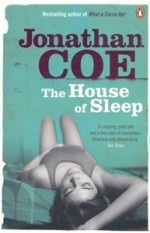
The House of Sleep is set in a clinic and research centre for sleep disorders that was previously a student hall of residence. Although it relies on a number of coincidences to reunite the characters from the past, it's a cracking read.
Somewhat wisely, Jonathan Coe doesn't show us clinical psychologist Dr Chloe Madison going about her work, although we do hear some rather raucous laughter from the other side of the door, which I thought she explained rather well. Less well justified – i.e. not at all – was her need to live in at the clinic, leaving me quite concerned for her ability to maintain her professional boundaries, especially when her relationship with her main colleague, the psychiatrist Dr Gregory Dudden, was so poor. This might account for why, when she had concerns about his practice, instead of raising them with the Royal College of Psychiatrists, she tried to get a journalist to investigate. (Yes I know she's just a fictional character, and it probably worked better for the plot, but it made me anxious.) In this context, the fact that she found her job through an advert in the British Journal of Clinical Psychology, a research publication, rather than the appointments memorandum of The Psychologist where real-life psychologists tend to look for new posts, matters only when I'm being especially mean.
Knowing little about Lacanian psychoanalysis beyond its complexity, I loved his set piece on Russell Watts's presentation to the psychiatrists on his analysis of Sarah, one of the point of view characters in the novel. The analyst had come up with a profound but extremely partial formulation of her difficulties, presented with a blatant disregard for confidentiality and a marked phallocentric bias. I'd be interested in what a Lacanian practitioner would have to say about the privileging of intellectual understanding over practical application – would they feel as prickly as I did with the clinical psychologist, or would they be able to see the funny side?
Finally, like many in the helping professions, although few would be so consciously aware of it, Dr Madison is using her work to fulfil some of her own psychological needs, but to spell out how would spoil the book for those who haven't read it. But let's face it, however much I harp on about the professional issues, it's those underlying vulnerabilities that draw us to a character.
I'll be posting next in this series in a month or so on The Rapture by Liz Jensen. In the meantime, do let me know what you think.





















 RSS Feed
RSS Feed





















